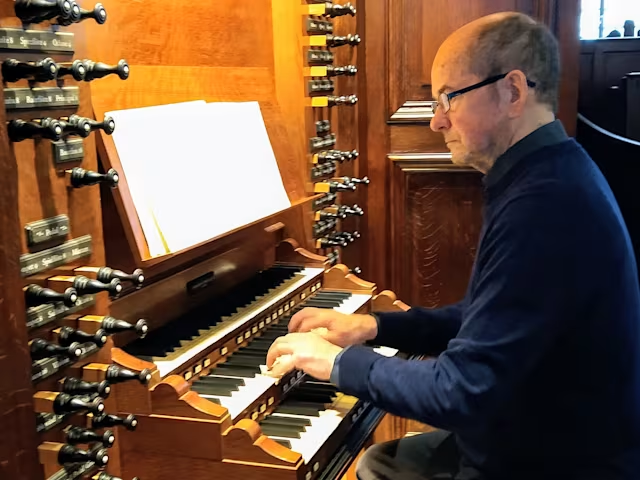Andrew Benson-Wilson

Another review suggested that a St John’s Smith Square recital was “one of the most rewarding organ recitals heard in London in years, an enthralling experience”. Another referred to his performance of Weckmann’s monumental Es is das Heil in St George’s, Hanover Square that “The performance had a confident and assured touch of someone who understood the musical style. His clarity of counterpoint allied to the programme notes helped the listener to identify the processes and individual lines of the music.” Another review of an early 17th-century North German programme stated that “Benson-Wilson’s playing was exemplary . . . a fabulous, joyous piece, full of exuberant flourishes, its infectious nature fully conveyed by Benson-Wilson . . . a sure grasp of structure while honouring the work’s more exploratory moments."
Andrew’s concerts have ranged from the enormous 1642 Festorgel organ in Klosterneuburg Abbey in Austria to a tiny 1668 chamber organ in a medieval castle in Croatia, and include the 1723 Hildebrandt organ in Störmthal, Leipzig (Bach gave the opening recital), the famous 1558 Ebert organ in Innsbruck’s Hofkirche and a reconstruction of the 1517 ‘swallow’s nest’ organ in Biel/Bienne, Switzerland, alongside many recitals on historic English organs, including Christ Church Spitalfields.
In 2020, Andrew was elected to The Royal Society of Musicians (founded in 1738) and the Council of The National Early Music Association (NEMA).
Andrew's reviews of early music concerts, recording, editions and books can be found here.
Biography

Andrew Benson-Wilson specializes in the performance of early organ music, ranging from the 14th-century to the Classical period. His playing is informed by his experience of historic organs, an understanding of period performance techniques, and several internationally renowned teachers. The first of his CDs of the complete Tallis organ works (with Chapelle du Roi) was Gramophone Magazine Record of the Month. The Organists’ Review noted that his “understanding of the historic English organ and its idiom is thorough, and the beautifully articulated, contoured result here is sufficient reason for hearing this disk. He is a player of authority in this period of keyboard music”.
Another review suggested that a St John’s Smith Square recital was “one of the most rewarding organ recitals heard in London in years, an enthralling experience”. Another referred to his performance of Weckmann’s monumental Es is das Heil in St George’s, Hanover Square that “The performance had a confident and assured touch of someone who understood the musical style. His clarity of counterpoint allied to the programme notes helped the listener to identify the processes and individual lines of the music.” Another review of an early 17th-century North German programme stated that “Benson-Wilson’s playing was exemplary . . . a fabulous, joyous piece, full of exuberant flourishes, its infectious nature fully conveyed by Benson-Wilson . . . a sure grasp of structure while honouring the work’s more exploratory moments."
Andrew’s concerts have ranged from the enormous 1642 Festorgel organ in Klosterneuburg Abbey in Austria to a tiny 1668 chamber organ in a medieval castle in Croatia, and include the 1723 Hildebrandt organ in Störmthal, Leipzig (Bach gave the opening recital), the famous 1558 Ebert organ in Innsbruck’s Hofkirche and a reconstruction of the 1517 ‘swallow’s nest’ organ in Biel/Bienne, Switzerland, alongside many recitals on historic English organs, including Christ Church Spitalfields.
In 2020, Andrew was elected to The Royal Society of Musicians (founded in 1738) and the Council of The National Early Music Association (NEMA).
Andrew's reviews of early music concerts, recording, editions and books can be found here.


